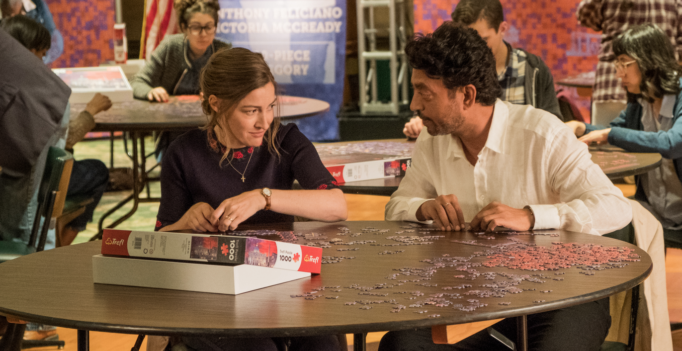By: Trevor Chartrand
By no means a masterpiece, Puzzle is a dramatic character study with some great performances – a quiet, nuanced beauty. Moving at a slow yet even pace, this film assembles the puzzle of these characters’ lives, only to tear it apart – piece by piece.
When under appreciated housewife Agnes (Kelly Macdonald) discovers her love and talent for solving jigsaw puzzles, her entire life is disrupted as she pursues personal freedom. Having grown up tending to others, Agnes considers her own needs for the first time, leaving her husband Louie (David Denman) and her two sons to fend for themselves. The ensuing journey leads her to Robert (Irrfan Khan), a divorced puzzle-master seeking a partner for an upcoming doubles competition. Agnes hides her newfound relationship from her family, and her bold, uncharacteristic choices take her to profoundly unexpected places.
Puzzle opens with an incredible sequence that establishes Agnes’ character in a remarkably creative and cinematic way. In just a few short scenes, we learn everything we need to know about our protagonist – in fact, this introduction is visual storytelling at its finest. While I was impressed at first, I was later disappointed to discover that this entire sequence is almost a shot-for-shot recreation of the Argentinian film Rompecabezas – which Puzzle is an adaptation of. The ideas that wowed me throughout this movie, the use of visual storytelling and withheld information, aren’t even original to this film. The writing I was so prepared to praise can’t be entirely attributed to these filmmakers. The American adaptation is no doubt its own entity, but it’s incredibly disappointing to learn the film world has added yet another remake to its library. You rarely see a novelist rewrite an existing book, and you wouldn’t want to. So why’s it acceptable for film?
Visually, Puzzle uses symmetry to create some impressive, almost tableau, images in many frames. And since this film takes its time, each image is onscreen long enough to be appreciated and studied. Credit for the detail in each moment goes to the art department, who have created a sparse yet lived-in environment that’s worth paying attention to.
As far as the cast goes, Kelly Macdonald and Irrfan Khan really pop on screen, with a complicated chemistry. Both characters are out of their element with each other, and the performers dance around one another in an effort to come to an understanding. There’s a tension between them that really drives the narrative effectively. Macdonald, most notably, spends a great deal of screen time alone, in silent reflection. She does an incredible job inviting audiences inside Agnes’ head, using the slightest shift in expression to convey a series of thoughts and decisions. These moments make for a truly profound and subtle performance.
Now just like any actor from the cast of The Office (U.S), it’s difficult to look at David Denman and not see his Dunder-Mifflin counterpart. Fans will recognize Denman for his performance as Roy, Pam’s neglectful fiancé of over three years. I hesitate to say ‘typecast,’ but it’s impossible not to notice the similarities between his character Louie in Puzzle and his former network TV role. Both are entitled and selfish partners who aren’t abusive per se, but they also aren’t supportive or even attentive towards their significant other’s needs. While he does a fine job with the role, it’s nothing we haven’t seen from this actor before.
Puzzle’s final moments could make or break the film for some viewers. With a wide-open ending, audiences will undoubtedly leave the theatre with a lot of unanswered questions. Depending on your proclivity for speculation, the final moments will either leave you putting the pieces together, or leave you hanging.
Overall, Puzzle is a thought-provoking film with memorable characters and interesting visuals, but the most concerning puzzle, to me, is the nagging question of the film’s merit as an original piece of art – versus simply being a recreation of borrowed ideas.
**********
Do You Tweet? Follow These Tweeple:
Trevor Chartrand: @OhHaiTrebor





Be the first to comment